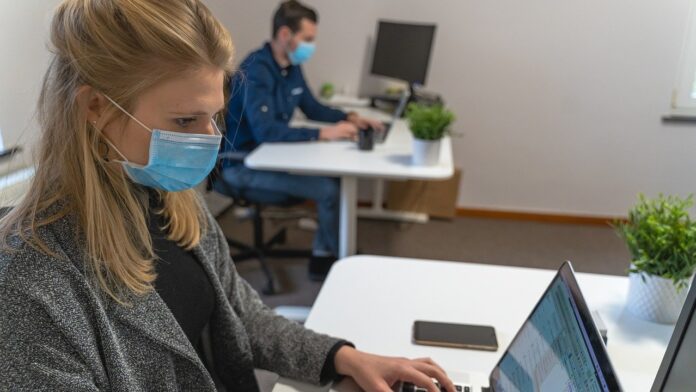With the speedy rollout of COVID-19 vaccines, things are finally looking up for Manchester after months of being couped up. The Government’s roadmap out of lockdown is an optimistic indication that the metropolitan’s way of life will soon return to normal. Indeed, if all goes well, the Government plans to lift all lockdown restrictions by June 21. It means people may now get together, mass events may take place, and enclosed public venues, such as nightclubs, may resume their operations. Businesses that temporarily closed will start bustling with people again, as employees go back to their desks after months of remote working.
While reopening businesses is welcome news, it also creates many questions and doubts in some people’s minds. Could individuals refuse to go back to the office? Could an employer force an employee to return to the workplace? Is it too soon to get back to normal? Is it too risky?
In his blog post, Mayor Andy Burnham of Greater Manchester requested workers to consider returning to their offices voluntarily. Doing so will help bring life back to the cities and the sectors economically devastated by the pandemic. He, however, cautioned against using threats to force people to go back to work, saying they are more likely to succeed in convincing people if they “do it in a gradual, careful, positive way.” He also stressed the necessity of practicing “a stronger, safety-first culture.”
But are the businesses in Manchester ready to open? What measures are they taking to prevent the further spread of the virus? More importantly, are these precautions enough to ensure everyone’s safety? Read on to find out how Manchester is preparing to go back to work.
Health and Safety
When Manchester entered its third lockdown in January 2021, the Government required anyone who can effectively work from home to do so. There were exceptions for workers in manufacturing and construction and employees who provide essential services. As the Government plans to ease restrictions, companies and the workforce now brace for the inevitable return to the workplace. However, despite all efforts to fight the pandemic, the threat of the virus remains. And for this reason, back to office work health and safety training should be the top priorities of businesses.
Companies in Manchester are taking this responsibility very seriously. Many are completing back-to-the-office online courses to help them become compliant with the COVID-19 return-to-work protocols. The restrictions put in place last year still apply to the majority of workplaces. The guide requires companies to carry out a COVID-19 risk assessment, impose cleaning and hygiene procedures, and maintain a two-meter distance in the office. If social distancing is not practicable, the business must create measures to reduce transmission risk.
Companies must, however, remember that health and safety also pertain to their employees’ mental health. Social isolation, fear of infection, and anxiety about the future could be as detrimental as any physical symptom. An unfamiliar workplace routine, reduction in income, or bereavement could exacerbate these worries. If possible, companies should consider making mental health assistance available to their employees.
New Flexible Hours
In a recent survey, 66 percent of employees worry about being infected on their commute to their office. The Government has proposed staggering shifts to help decongest public transport and traffic during rush hour, thus reducing the risk of COVID-19. A flexible working schedule would also lessen the number of employees in the workplace and prevent long queues in entrances and exits. Staggered breaks would also keep people from crowding gathering areas such as communal kitchens during lunch.
The Government also suggested that companies, where possible, divide their employees into teams and assign them with alternate schedules to create a mix of home and office-based working approach. More and more Manchester businesses support flexible hours and remote employment, allowing their staff to work in the office during specific days of the week and at home for the rest. Aside from reducing infection, work from home also improves employees’ work-life balance and cuts commuting expenses. Moreover, it benefits the companies as it lets them save on office space and operation expenditures, minimises absences, and increases employee satisfaction.
Expanding HR Departments
The coronavirus pandemic has disrupted the day-to-day operations of nearly every industry one way or another. With all the unexpected changes, the Human Resource department finds itself performing new tasks in an unfamiliar work environment.
Since the lockdown, numerous businesses have switched to remote work on an unprecedented scale, prompting HR to create guidelines and protocols for home working. On top of this, they have to ensure the company complies with the new health and safety regulations and is COVID-19 secure. Additionally, they have to process piles of paperwork, comfort workers who have been furloughed or laid off, and keep those who are still on the job motivated and productive.
Although the pandemic has caused a rise in unemployment, several Human Resource departments in Manchester are recruiting HR professionals to keep up with regulatory compliance, such as COVID-19 safety guidelines, and help with scouting for new talents when the economy re-opens.
COVID Risk Assessment
The Health and Safety Executive (HSE) requires all businesses to make their workplaces COVID-secure by taking stringent but reasonable measures to protect their employees from the virus. Companies should conduct a COVID-19 risk assessment to help manage the hazards and ensure workers are safe.
The first step of the risk assessment process is identifying activities and situations that could cause the virus to spread. The second is determining who is at risk, followed by removing the risk if possible.
Employers should also note that some employees are more vulnerable to the virus than others or may experience more adverse effects if infected.
The Government’s guidance on COVID-19 work safety is pretty much straightforward and practical. The precautions include implementing social distancing, adjusting working hours to avoid overcrowding, and providing more handwashing facilities. Companies should also maintain good ventilation and air conditioning in offices or enclosed places to reduce the likelihood of spreading the virus. Where close contact is unavoidable (i.e., salon), employees and visitors should wear proper protection such as face masks or coverings.
Construction
Companies don’t have to remodel an entire building to make it COVID-secure. However, some offices may need a bit of a facelift to support social distancing and other safety measures. For instance, employers need to separate workspaces using screens or barriers and arrange desks in a manner that accommodates back-to-back or side-by-side sitting instead of face-to-face working.
In shared spaces and common areas, where queues are unavoidable, floors should have tape or paint markings to remind people about the two-meter-apart rule. There should be sanitizing stations throughout the premises so employees and visitors can conveniently access them.







